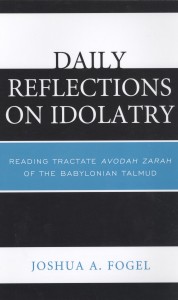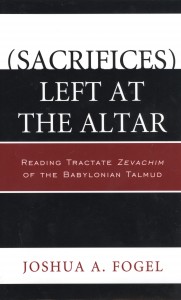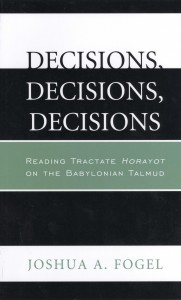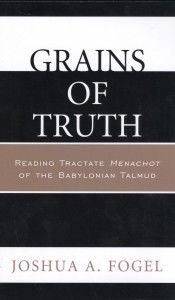Dear colleagues,
I’m sure you will join me in congratulating our colleague, Josh Fogel. He dropped off four books he’s published over the past year or one-half. Each one takes up a separate tractate of the Babylonian Talmud and addresses its content, page by page, reflecting a style of reading (known as daf yomi) among the observant. The titles (all published by Hamilton Books):
 Daily Reflections on Idolatry: Reading Tractate Avodah Zarah of the Babylonian Talmud
Daily Reflections on Idolatry: Reading Tractate Avodah Zarah of the Babylonian Talmud
“Comprised of rabbinic debates in the aftermath of the destruction of the Second Temple (70 C.E.), the Talmud has provided the basis for Jewish ethical and practical norms for centuries. It is also an extremely long and forbiddingly difficult work that has accumulated countless commentaries just as complex. A recent translation with extensive notes has made the Talmud more accessible to English-language readers, but the textual difficulties remain. This volume looks at Avodah Zarah, one tractate of the Talmud concerned with idolatry, page by page. Idolatry was one of the cardinal sins for which an observant Jew was to accept death before transgressing. Daily Reflections on Idolatry offers a modern commentary with doses of humor and comparative examples in an effort to both explain and humanize the text and make it even more accessible to contemporary readers.”
 (Sacrifices) Left at the Altar: Reading Tractate Zevachim of the Babylonian Talmud
(Sacrifices) Left at the Altar: Reading Tractate Zevachim of the Babylonian Talmud
“Following the destruction of the Second Temple in 70 C.E., Judaism faced a serious crossroads. The rabbis of late antiquity spent the next few centuries in extensive debates in an effort to create an ethical and practical basis for a Torah-based faith. Their extensive discussions constitute the bulk of what we now know as the Talmud. This collection is not only massive; it is forbiddingly difficult and has accumulated numerous commentaries over the centuries since it first appeared. Recent translations have made it somewhat more accessible to English-language readers, but textual difficulties remain. This volume looks at tractate Zevachim (Sacrifices), which is mostly concerned with meat offerings slaughtered and presented at the Temple (when it stood). Joshua A. Fogel approaches the text, page by page, commenting with doses of humor and comparisons in a manner meant to explain and humanize the text for contemporary readers.”
 Decisions, Decisions, Decisions: Reading Tractate Horayot of the Babylonian Talmud
Decisions, Decisions, Decisions: Reading Tractate Horayot of the Babylonian Talmud
“Comprised of debates among the rabbis of late antiquity in the aftermath of the destruction of the Second Temple (70 C.E.), the Talmud has provided the basis for Jewish ethical and practical norms for centuries. It is also an extremely long and forbiddingly difficult work that has accumulated countless commentaries just as complex over the ages. A recent translation with extensive notes has made it more accessible to English-language readers, but the textual difficulties remain. This volume looks at the tractate Horayot (Decisions), page by page, and offers a modern commentary with doses of humor and comparative examples in an effort to both explain and humanize the text and make it even more accessible to contemporary readers. The central focus concerns how to adjudicate cases when the governing body, the Sanhedrin, incorrectly designates certain practices legal and people follow the erroneous advice as a result.”
 Grains of Truth: Reading Tractate Menachot of the Babylonian Talmud“
Grains of Truth: Reading Tractate Menachot of the Babylonian Talmud“
Following the destruction of the Second Temple in 70 C.E., Judaism faced a serious crossroads. The rabbis of late antiquity spent the next few centuries immersed in extensive debates in an effort to create an ethical and practical basis for a Torah-based faith. Their discussions constitute the bulk of what we know as the Talmud. This collection is not only massive; it is forbiddingly difficult, having accumulated numerous commentaries over the centuries since it first appeared. Recent translations have made it somewhat more accessible to English-language readers, but textual difficulties remain. This volume looks at tractate Menachot (grain offerings), which is concerned mostly with grain offered at the Temple (when it stood) to atone for various misdeeds.”
On behalf of the Department, I would like to congratulate you.
Sincerely,
Marcel
